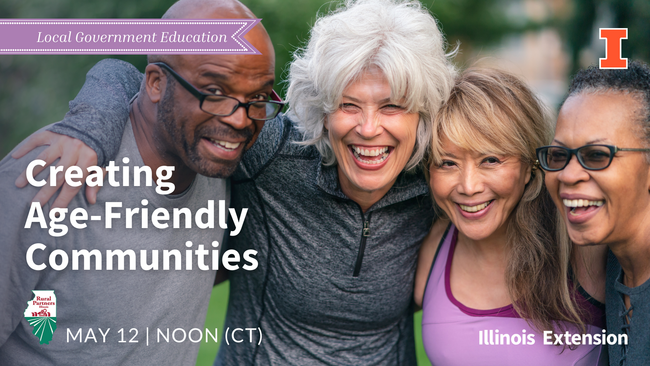
In 2030, one of every five people will be aged 65 or older, according to AARP. The U.S. Census Bureau expects the number of people in the U.S. over 65 years of age to reach 77 million by 2034. As these baby boomers retire and make up a vast portion of small community constituencies, their needs and interests are of increasing relevance to local government and community leaders
Successful age-friendly communities provide affordable and accessible housing options, access to vital services, and foster economic growth, opportunities, and activities that benefit people of all ages but uphold a public commitment to addressing the needs of older people.
The World Health Organization, in partnership with AARP, has developed a set of guidelines and resources for communities seeking “Age-Friendly” status. This process involves organizing community stakeholders to evaluate, plan, and implement strategies to improve the lives of older adults in their community.
Join Wendy Bartlo, assistant director for the Center on Health, Aging, and Disability at University of Illinois at Urbana-Champaign, as she shares insights into community implementation strategies and highlights successful examples of Age-Friendly community initiatives in a free, online Local Government Education event co-hosted by University of Illinois Extension and Rural Partners.
Register in advance to attend: go.illinois.edu/AgeFriendlyCommunity
If you need a reasonable accommodation to participate, contact Nancy Ouedraogo, organizer and Extension specialist, at esarey@illinois.edu. Early requests are strongly encouraged to allow sufficient time to meet your access needs.
ABOUT THE PRESENTER:
Wendy Bartlo serves as assistant director for the Center on Health, Aging, and Disability at University of Illinois at Urbana-Champaign, where she helped to start the Age-Friendly Champaign-Urbana Initiative in 2017. Prior to joining CHAD, Bartlo completed her doctorate in anthropology and pre-doctoral fellowship in gerontology at Wayne State University in Detroit, where she spent two years researching the lives of older adults in Detroit neighborhoods.